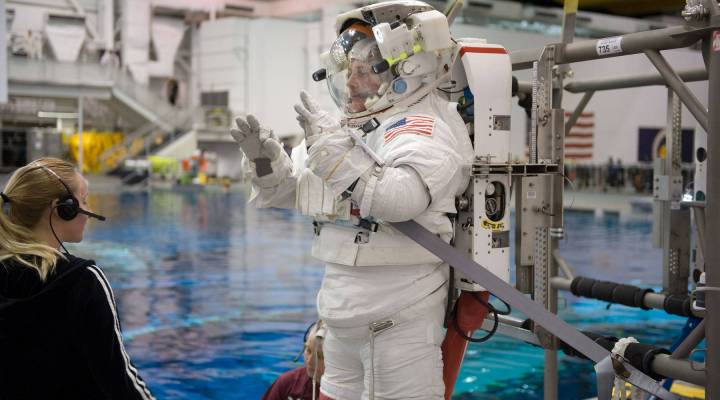
How to be an astronaut

Everyone has a dream job growing up: doctor, vet, ice cream taste tester. But how do you actually get the gig? Marketplace Weekend is looking into how, with the occasional series, How to be a…
NASA astronaut Col. Doug Wheelock is starting off the series with his guide to becoming an astronaut. Wheelock has been an astronaut for 19 years. He’s spent 178 days in space as a flight engineer and then a commander, and has completed six space walks totaling over 43 hours. Here’s his advice on becoming an astronaut:
My name is Doug Wheelock. Right now I’m a NASA astronaut and I’m sitting in Houston, Texas at the Johnson Space Center. I’ve flown in space twice once on the Space Shuttle Discovery and then I lived in space for six months in 2010 as the commander of the International Space Station.
So what we look for in folks that want to become an astronaut or work at NASA, is we look for people who are interested in the STEM fields (science technology engineering and math.) We encourage everyone to find a particular area in those courses of study that they really enjoy. Develop a passion for it. Be curious about the world around you and always ask questions.
We do have some height qualifications I think it’s 62 inches to 76 inches so that’s 5’2 to 6’4. And that’s only so you can fit in our spacesuit and so you could fit in the space ships as well. Also to be physically active and healthy is a requirement, because the body goes through a lot of stress when you go to space. So we need folks with a strong sense of hand-eye coordination and physically able to do more difficult manual work. And with the vision, as long as your vision is correctable to 20/20, it’s no problem if you wear glasses.
We normally pick our astronauts when they’re about mid 30s anywhere from 30 to 38 usually is kind of the average age of a person being selected as an astronaut. So when I meet with students say in high school or even just in coming through college. My first advice to them is just relax. You get plenty of time.
And I encourage students of all ages to have a plan. Of course an advanced degree in science and technology engineering and math. Are highly desirable. So if you can work toward a master’s degree and even a Ph.D, we love to see that and are astronauts. But even more importantly, be able to work in a operational environment, to have some work experience as well where you use your schooling in decision making and problem solving and things like that but to not make being an astronaut your end-all and be-all goal. Because in the process, you know the selection is so stringent, you want to be able to be enjoying what you’re doing as well. If you don’t make it into the astronaut corps, at least you have a cool job that you love.
Once you get here, when someone select as an astronaut for the first two years they’re actually focused 100 percent on training. Our astronauts are learning about the systems on the space station but also about our new rockets. Our astronauts are learning Russian and some of them flying on a Russian Soyuz up to the space station. And we have new vehicles that are coming you may have heard about SpaceX and Boeing they’re building vehicles, rockets that are going to launch from Florida. It’s really pretty fun training to be an astronaut. I’ve been an astronaut now for 19 years. I still feel like a young kid just walking in the front door here.
There’s a lot happening in the world. Through it all, Marketplace is here for you.
You rely on Marketplace to break down the world’s events and tell you how it affects you in a fact-based, approachable way. We rely on your financial support to keep making that possible.
Your donation today powers the independent journalism that you rely on. For just $5/month, you can help sustain Marketplace so we can keep reporting on the things that matter to you.












